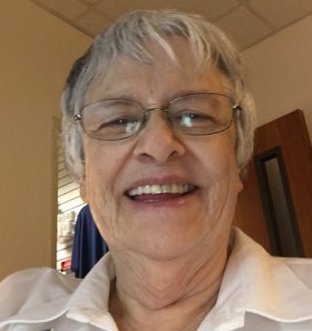By Lori Salazar
Sue Schrader became a vital contributor to the LGBTQ community in Dallas in an unexpected venue. Having not been particularly religious when she moved to Dallas in 1981, she eventually found herself working for social justice and equity for LGBTQ people at MCC Dallas (later to be renamed Cathedral of Hope, the world’s largest LGBTQ-serving congregation. She still works at COH today and is the longest-serving staff member in the church’s history.
Growing up as the baby of her family in Norther Indiana, Schrader remembers feeling as though she didn’t know her three brothers and two sisters very well since two of her brothers served in World War II and one of her sisters was a pharmacist mate during the war effort. Growing up, Schrader recalls her mother, who was born in 1898, offering the following advice: “When you get married, you are married for life and whatever your husband wants to do is what you do. So do what you want to do before you get married.” She decided to take her advice to heart after finishing graduate school at Southern Illinois University when she accepted a teaching position at Stephen F. Austin State University in Nacogdoches, Texas. She was persuaded to move to Texas by a friend who was the head of the Women’s Physical Education department there.
Schrader had been dating a woman who lived in Dallas, but by the time she moved to Dallas in 1981, they were no longer together, so she came to a big city without friends or community. She got a job as an outside sales rep for a bookkeeping company. Her first summer in Dallas, she lost twenty pounds due to a heat wave with the temperatures over 100 degrees all summer. She recalls dressing in what she called “full drag”—heels and full makeup—to trek off to work during this unusually hot summer.
During this time, she was invited by a friend of her ex-girlfriend to attend a service at her church. Schrader’s original reaction was “I don’t go to church. I haven’t been to church since I was nine years old! Why would I go to church?” She didn’t know that this experience would lead her to work for over forty years at the Cathedral of Hope, which at the time was MCC Dallas, a Metropolitan Community Church (MCC). The MCC was founded in 1968 Los Angeles by Rev. Troy Perry to serve LGBTQ people who had otherwise been abused and abandoned by their churches. Schrader was overwhelmed with emotion at her first visit, as many people are when they see a predominately LGBTQ congregation worshipping for the first time. Later, she would often attend services, sitting in the back pews, observing, and listening to inspirational quotes of faith and healing from the pastor. Schrader always snuck out of the church before services finished, until one Sunday, when senior pastor Rev. Don Eastman was away after Christmas, one of the associate pastors, Rev. Joan Wakeford, who came from a Pentecostal background, decided to do an “altar call” toward the end of the service. An “altar call”—which was atypical at MCC Dallas—involved worshippers coming to the altar to declare their commitment to Christ. Schrader was nervous, but went to the front of the church to participate. Afterward, she felt “shook up” and wanted to find out how to get involved in the church, asking the pastor if they “take beginners here.” Wakeford replied “Oh, we take everybody.” Schrader came back to the church the next day and it was not long before she was volunteering on a regular basis.
Schrader started her ministry at MCC Dallas as a volunteer typist on an IBM Selectric typewriter, writing letters to first-time visitors. Then, she was answering phones and was hired as the church’s administrative assistant. Before long, she began helping the church’s pastors and with community initiatives. Schrader remembered how the church helped men who were having a hard time assimilating into the community after being a part of an early release jail program. She recalled that the men were dumped in the city without any resources, a place to go, or even any money to help them survive, once released from prison. Schrader describes how the church had created a food pantry program called the Deacon’s Closet to help give groceries to these hungry men and to others who were food insecure. With the help of Rusty Baldrigde, the church created a larger outreach program called BACH, Breakfast at Cathedral of Hope, which now feeds two to three hundred people a week. The program also helps with other social services like providing free haircuts, checking blood pressure, administration of vaccines, and more. Years later the church created iCARE, which now feeds a hot lunch on Mondays for those who are food insecure as well as providing bags of groceries for those being served.
Sue Schrader speaking at the 1994 annual Extra Mile Award ceremony. Lory Masters is seated.
Over the years Schrader has seen the power of LGBTQ-affirming ministry at Cathedral of Hope, and she has seen the anti-queer violence and stigma in Dallas directed at the church. Schrader recalled a story when the congregation was looking to purchase another church building. When “one church found out that it was us that was looking at their church, they said, ‘We’ll burn it to the ground before we sell it to you.’”
The church experienced devastating losses during the AIDS crisis. Schrader recalls that they had “at least one funeral or memorial service every week” and “sometimes two or three” services for their fallen church members. One month saw the church perform 31 funerals. Over the years, Cathedral of Hope has lost over 1,500 members to AIDS. Schrader also recalls that parents, family members, and friends often said “Oh, he had pneumonia and then died,” trying to conceal their loved one’s diagnosis of HIV/AIDS. She remembers that she would talk to friends whose partners died and their families often came in and cleaned out everything, leaving no trace left of their loved after they died. “It happened over and over again” and explains that “it was just devastating, and it broke a lot of people.” The front entrance of Cathedral of Hope is the John Thomas Memorial Bell Wall, designed by Alan Johnson and Alan Ritchie and named for a leading gay activist in Dallas who was also an active member of Cathedral of Hope.
1993 Extra Mile Award recipients (l-r) Karen Ashmore, Mary Franklin, Timothy Seelig, Feleshia Porter, Carol West and Sue Schrader
In 2006, the church joined the UCC, becoming one of the biggest churches in their denomination. A Protestant denomination, The United Church of Christ was originally founded by New England Pilgrims and settlers. These congregations are also historically liberal in their practices, often advocating for civil rights, LGBTQ+ rights, abortion, and women’s rights.
Sue Schrader still works at the Cathedral of Hope as Manager / Buyer for Sources of Hope Gifts & Books. As a staff member and long-time member of the church, she has been a part of the church’s mission to promote equality, spirituality, and love for all members of their congregation and to celebrate the value of all LGBTQ+ people.



